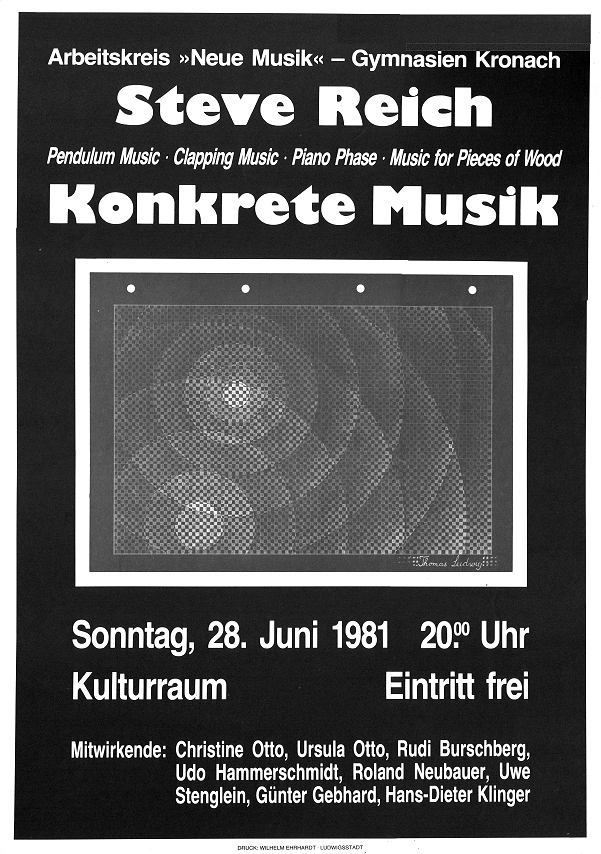Music as a Gradual Process
1968
I do not mean the process of composition, but rather pieces of music that are, literally, processes.
The distinctive thing about musical processes is that they determine all the note-to-note (sound-to-sound) details and the over all form simultaneously. (Think of a round or infinite canon.)
I am interested in perceptible processes. I want to be able to hear the process happening throughout the sounding music.
To facilitate closely detailed listening a musical process should happen extremely gradually.
Performing and listening to a gradual musical process resembles: pulling back a swing, releasing it, and observing it gradually come to rest; turning over an hour glass and watching the sand slowly run through to the bottom; placing your feet in the sand by the ocean’s edge and watching, feeling, and listening to the waves gradually bury them.
Though I may have the pleasure of discovering musical processes and composing the musical material to run through them, once the process is set up and loaded it runs by itself.
Material may suggest what sort of process it should be run through (content suggests form), and processes may suggest what sort of material should be run through them (form suggests content). If the shoe fits, wear it.
As to whether a musical process is realized through live human performance or through some electro-mechanical means is not finally the main issue. One of the most beautiful concerts I ever heard consisted of four composers playing their tapes in a dark hall. (A tape is interesting when it’s an interesting tape.)
It is quite natural to think about musical processes if one is frequently working with electro-mechanical sound equipment. All music turns out to be ethnic music.
Musical processes can give one a direct contact with the impersonal and also a kind of complete control, and one doesn’t always think of the impersonal and complete control as going together. By „a kind“ of complete control I mean that by running this material through this process I completely control all that results, but also that I accept all that results without changes.
John Cage has used processes and has certainly accepted their results, but the processes he used were compositional ones that could not be heard when the piece was performed. The process of using the I Ching or imperfections in a sheet of paper to determine musical parameters can’t be heard when listening to music composed that way. The compositional processes and the sounding music have no audible connection. Similarly in serial music, the series itself is seldom audible. (This is a basic difference between serial (basically European) music and serial (basically American) art, where the perceived series is usually the focal point of the work.)
What I’m interested in is a compositional process and a sounding music that are one and the same thing.
James Tenney said in conversation, „then the composer isn’t privy to anything“. I don’t know any secrets of structure that you can’t hear. We all listen to the process together since it’s quite audible, and one of the reasons it’s quite audible is, because it’s happening extremely gradually.
The use of hidden structural devices in music never appealed to me. Even when all the cards are on the table and everyone hears what is gradually happening in a musical process, there are still enough mysteries to satisfy all. These mysteries are the impersonal, unintended, psycho-acoustic by-products of the intended process. These might include sub-melodies heard within repeated melodic patterns, stereophonic effects due to listener location, slight irregularities in performance, harmonics, difference tones, etc.
Listening to an extremely gradual musical process opens my ears to it, but it always extends farther than I can hear, and that makes it interesting to listen to that musical process again. That area of every gradual (completely controlled) musical process, where one hears the details of the sound moving out away from intentions, occuring for their own acoustic reasons, is it.
I begin to perceive these minute details when I can sustain close attention and a gradual process invites my sustained attention. By „gradual“ I mean extremely gradual; a process happening so slowly and gradually that listening to it resembles watching a minute hand on a watch — you can perceive it moving after you stay with it a little while.
Several currently popular modal musics like Indian classical and drug oriented rock and roll may make us aware of minute sound details because in being modal (constant key center, hypnotically droning and repetitious) they naturally focus on these details rather than on key modulation, counterpoint and other peculiarly Western devices. Nevertheless, these modal musics remain more or less strict frameworks for improvisation. They are not processes.
The distinctive thing about musical processes is that they determine all the note-to-note details and the over all form simultaneously. One can’t improvise in a musical process — the concepts are mutually exclusive.
While performing and listening to gradual musical processes one can participate in a particular liberating and impersonal kind of ritual. Focusing in on the musical process makes possible that shift of attention away from he and she and you and me outwards towards it.
Once again, but now in full length – DLF Studiozeit, 12. Juni 1992

